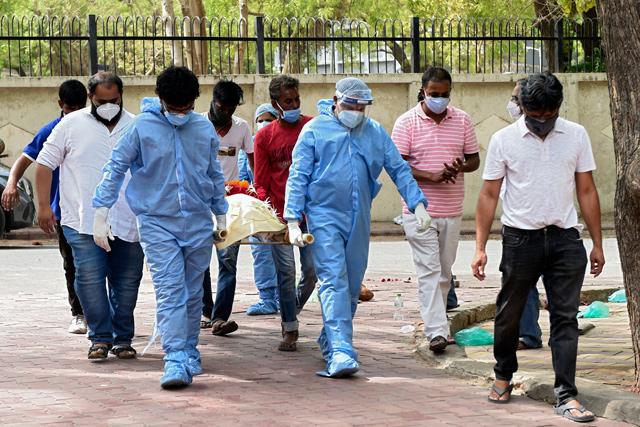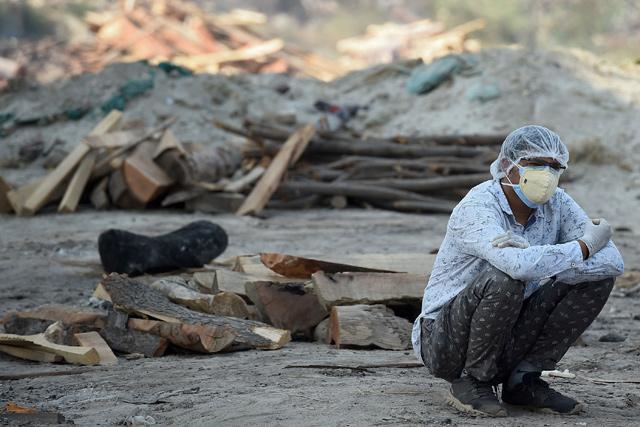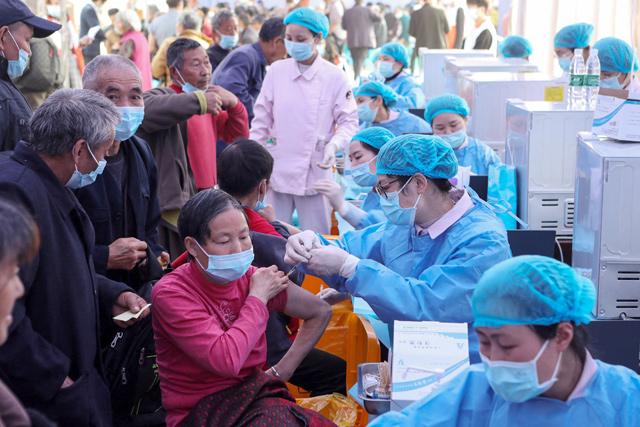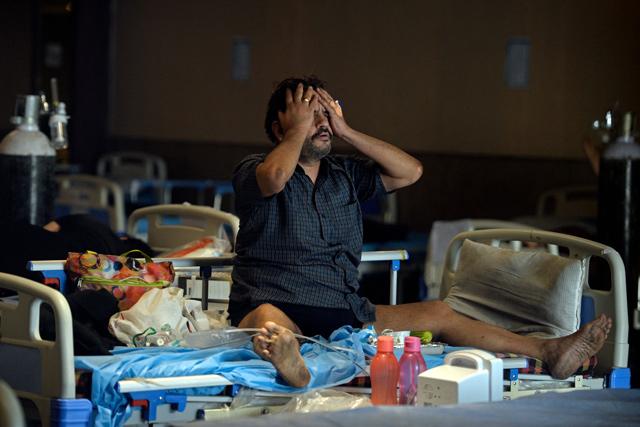You are here
Virus deaths top 4,000 in India as WHO green-lights Chinese vaccine
By AFP - May 08,2021 - Last updated at May 08,2021

Family members and relatives carry the body of their loved one who died of the COVID-19 coronavirus at a crematorium in Ahmedabad on Saturday, as India recorded more than 4,000 coronavirus deaths in a day for the first time (AFP photo)
NEW DELHI — New COVID-19 deaths surged past 4,000 for the first time in India on Saturday as it struggled with one of the world's worst outbreaks, but the global immunisation effort was boosted with World Health Organisation (WHO) approval for Chinese firm Sinopharm's vaccine.
And while many Western countries have started easing restrictions thanks to rapid vaccinations, the head of the WHO warned that more countries could suffer the kind of deadly outbreaks currently raging in India, Brazil and Nepal.
India now accounts for nearly half of the world's new known cases according to an AFP database, and it reported a national record 4,187 new deaths on Saturday.
The Indian government has struggled to contain the outbreak, which has overwhelmed its healthcare system and sparked anger and frustration among the public.
"The government says that there is ample supply of medicines and oxygen," said Brijesh Pandey, who spends hours every day jostling with others to try to secure oxygen for his brother-in-law.
"But look how hundreds of desperate people are struggling to save their brothers, sisters and parents."
India reported more than 400,000 new infections on Saturday, but many experts suspect the official death and case numbers are a gross underestimate.
The surge has spilled into next-door Bangladesh, Nepal and Sri Lanka.
Its eastern neighbour Pakistan on Saturday began a nine-day shutdown targeting travel and tourist hot spots to try to stop its outbreak from snowballing during the upcoming Eid celebrations at the end of the Islamic holy month of Ramadan.
The Eid holidays usually see a mass movement of people across the nation of 220 million, and the government has mobilised the military to help enforce the restrictions.
But mosques, which have been packed each night throughout Ramadan, will remain open despite the virus threat.
‘Unacceptable’ vaccine inequality
The global arsenal against the coronavirus expanded on Friday as the vaccine from China’s Sinopharm became the first fully non-Western shot to get the green light from the WHO.
The WHO has already given emergency use authorisation to vaccines from Pfizer-BioNTech, Moderna, Johnson & Johnson, and AstraZeneca, a status that paves the way for countries to quickly approve and import shots.
Sinopharm is already in use in 42 territories around the world, including Pakistan, Egypt, the United Arab Emirates and Serbia.
The approval came as the WHO reiterated its warning about worsening outbreaks in many countries, with more cases reported in the past two weeks than during the first six months of the pandemic.
“We’re deeply concerned that many more countries will continue to be affected,” WHO Director General Tedros Adhanom Ghebreyesus said on Friday, imploring wealthier nations to help end the “unacceptable” inequality in global vaccine access.
“We will see serious situations like what we see now in India, in Brazil.”
The United States this week backed a push led by the WHO, India and South Africa to waive COVID-19 vaccine patent protections to boost supply to poorer nations.
But the European Union on Friday voiced scepticism, saying such an intellectual property waiver will not help.
“An IP waiver will not solve the problems, will not bring a single dose of vaccine in the short- and medium-term,” European Commission chief Ursula von der Leyen said.
EU officials briefing journalists in Brussels on the issue said the hoarding of vaccine inputs by other countries was a larger obstacle.
Worries about Tokyo Olympics
Rapid vaccine rollouts worldwide are considered critical in the fight against the virus, which has killed 3.26 million people so far, and some countries with high immunisation rates such as Britain are already easing restrictions and testing events with large gatherings again.
But concerns are swirling about the upcoming Tokyo Olympics, with Japan’s vaccination programme moving slowly.
A coronavirus state of emergency in parts of Japan, including Tokyo, was extended on Friday with authorities warning of some hospitals being overwhelmed.
The pandemic has already disrupted test events for the Olympics, with several postponed, cancelled or moved abroad.
But International Olympic Committee vice-president John Coates was adamant Saturday that the Games will go ahead despite the risks.
Asked by AFP if there was any scenario in which the event, due to start on July 23, could be cancelled or postponed again, he replied: “No, there’s not”.
Related Articles
NEW DELHI — New COVID-19 deaths surged past 4,000 for the first time in India on Saturday in one of the world's worst outbreaks, as EU press
BEIJING — China on Sunday announced it had administered its one-billionth shot in the world's biggest coronavirus inoculation drive as Brazi
LONDON — Schools and stores reopened in several parts of Europe on Monday as the continent eased out of months of COVID-19 lockdowns, but In

















